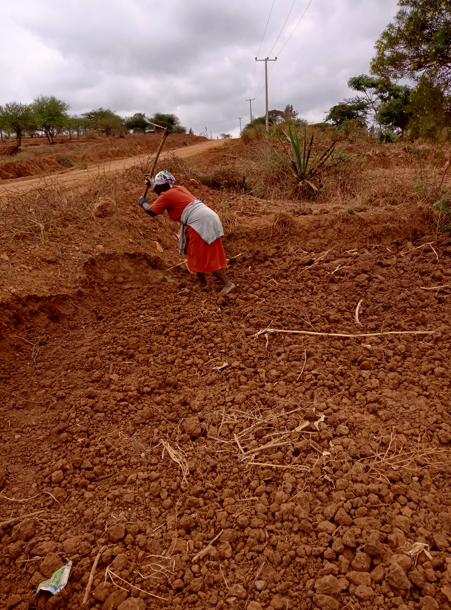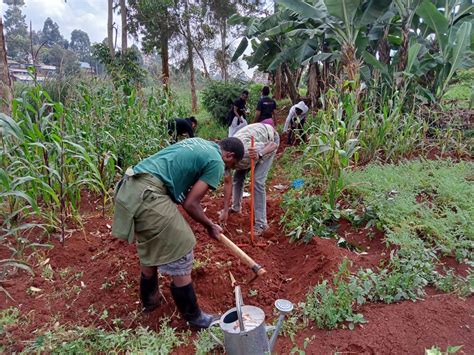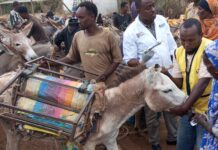By Tebby Otieno
The sight of horizontally ploughed farms, farmers ploughing and adding manure in their farms is what welcomes any visitor in Kaani, Machakos county. The urgent activity in the farms is a clear indication that farmers here are set for the planting season.
Farmers in this area prefer to practice organic farming, a natural process of agriculture which limit the use of chemicals and allow agriculture to be more environmentally friendly while maintaining a stable supply of food.
Experts say that this kind of practice improves the adaptive capacity of agroecosystems and reduces vulnerability to natural disasters, climate change impacts, and new emerging environmental economic system stresses and shocks.
Catherine Kemeu, is one of farmers here. She has been practicing organic farming for the past 20 years. She says that this kind of farming is affordable because she uses available resources every season. She does not buy chemical fertilizer, the manure that she adds in her farm is waste from chicken, cattle, goats and sheep that she also keeps.
“I never use fertilizer, I only use manure. Organic farming is good because it has no side effects,” said Kemeu.
Kemeu plants maize, vegetable, legumes, sweet potatoes and fruits. Her skills in organic farming improved after she attended a three weeks’ seminar in Embu town and a training at Jomo Kenyatta University of Agriculture, where she was trained alongside other farmers.
“I have enough knowledge about organic farming and that is the kind of agriculture I practice here. Even if you come here on a rainy season you will not see fertilizer but healthy maize and beans growing from the manure,” she said.
While conventional farmers have to buy seeds every planting season, organic farmers store their seeds. Those who do not have, at least know which neighbour to run to. Kemeu says people in her community have learnt the culture of preserving the best from every harvest.
“I have maize that I plant. I keep them in my kitchen, smoke from burning firewood during cooking preserves them even for a whole year while still safe. Even beans I add wood ash to preserve them safe,” said Kemeu.
Cassava is another food crop treasured by locals here. Philys Nzioka, a cassava farmer says, they have retained a species of cassava their parents used to plant in 1982.
“We are retaining this indigenous type of cassava because we get more harvest from it which we also sell and get income to take care of our home needs as a family,” said Phylis.
Machakos county is one of the regions in Kenya that is described to be receiving little rainfall.
Farmers practising organic agriculture here say, indigenous are drought resistant, they survive even when there is little rainfall.
Ruth Kevuva is another organic farmer here in Machakos. She says this kind of agriculture has never disappointed her because she always gets high yields from her small piece of land to feed her familyand sells the surplus to take care of other needs.
“I am preparing this land for planting by adding farm manure. After making rows then I will plant the traditionally preserved maize seed,” said Kevuva.
According to the Food and Agriculture Organization (FAO), agroecology seeks to transform food and agricultural systems. It builds resilience against climate change and market shocks at the same time empowers the farmer.

Agroecology integrates scientific understanding about how particular places work (that is the
ecology) with the farmer’s knowledge of how to make their local landscape useful. It focuses on the value of diverse and complex methods of land use.
Agroecology is the general term for different agricultural practices. This includes; biological control of pests rather the use of chemical control, planting different crops rather one single crop, intercropping, mixed crop and livestock farming, and crop rotation. Agroecology benefits from traditional systems and modern science of ecology.
Claire Nasike, campaigner at Greenpeace Africa, says practicing agro ecology is impactful because it is safe and ensures people enjoy their food sovereignty.
“Agroecology ensures that people have access to diverse foods that are locally relevant, farmers particularly women farmers have access to land and seeds, the soil is healthy, water bodies areprotected from pollution and biodiversity is safeguarded,” said Nasike.
Farmers we interviewed in Machakos, have learnt the art of water harvesting during rainy season.Some also tap water from the nearby river and store in their tanks for irrigation when there is shortage of rain.
Agroecology and the right to food report, presented before the UN Human Rights Council, while marking World Food Day in March, indicated that agroecology can double food production.
However, to realize this, agroecology has to be sufficiently supported, in entire regions within 10 years while mitigating climate change and alleviating poverty.
According to Layla Liebetrau, project lead at Route to food, agroecology protects and provides ecosystem services like pollination, national pest control, nutrient and water cycling and erosion control. They therefore encourage farmers to shift from conventional ways of agriculture and join farmers who are practicing agroecology for sustainable agriculture practices.
“Right to food is protected in the Kenyan constitution and the government needs to protect, respect and fulfil it by ensuring nobody dies,” said Liebetrau.
Food sovereignty is the people’s right to healthy and culturally appropriate food produced through sustainable methods. It also gives them the right to define their own food and agricultural systems.
It is a food system guided by principles that focus on food for people, value food providers, ensure localization of food systems and local control of food providers and consumers over territory.














